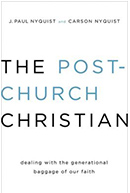
25-year-old Carson Nyquist and his father, Moody Bible Institute President J. Paul Nyquist, are wrestling with generational issues affecting churches. Photo courtesy of Moody Collective.
25-year-old Carson Nyquist is the co-author of The Post-Church Christian: Dealing with the Generational Baggage of Our Faith. In it, he shares stories of growing up in the evangelical church while his father, the President of Moody Bible Institute, responds to these experiences. Here Carson talks about why his generation is leaving the Christian church and what he thinks it will take to draw them back.
JM: Your father is the President of Moody Bible Institute, a prominent evangelical college. What did you learn from each other through working on this project? Did you uncover differences and/or realize that you agreed on more than you expected?
CN: I learned that he, and his generation, have a history. A history that is full of passionate, courageous people who want to follow Jesus. [They were] a generation that pushed social and cultural norms to reach people and spread the message of Jesus. And that what sometimes annoys me today, in my culture, was once a dynamic idea for reaching people with the gospel. They had ideas that pushed against their parents’ standards – just like mine do today.
I think he learned a lot about my generation. About how we think, how we dream, and what we value. In the process of writing we had many conversations, covering topics like tattoos, alcohol, language and vocation – each areas where we think differently. In the end, we didn’t agree on everything. We still don’t. But now we have a more open relationship where we can talk about those things. That, in my mind, is a great goal for any intergenerational relationship.
JM: How important is intentional intergenerational dialogue to crafting a more unified church?
CN: Dialogue between generations is a must, especially in the context of the church. So often a ministry or church molds itself to the dominant generation leading the way. This is true for Boomers, Busters and Millennials. The importance of communication cannot be underestimated in these cases. Not only does it build trust, but it also provides the opportunity to learn from each other. To be teachable in the context of intergenerational dialogue – that is the key.
JM: Is it ironic to you that as churches have become increasingly wrapped up in “youth culture,” they have actually lost the people they’ve been targeting? What affect has this youth-centric approach had on older generations?
CN: I think it is ironic. Look around and you can point out numerous churches trying to be “cool” and “relevant.” Yet, Barna still says that 59% of young people are leaving the church. Obviously this is not the answer.
I think the church needs to understand the enormous value our generation is placing on community outside the church. For many who have left the church, they are not leaving their faith or their community – they’re leaving their churches. In place of Sunday morning gatherings, they’ve found love and acceptance elsewhere. Churches will never get my generation back by having the latest technology or becoming hipster. Those are not values we expect the church to accept. We’re looking for relationships. We’re looking for purpose in life. We’re looking for a refreshed faith.
When the church throws itself into entertaining us, we walk out. And in return, older generations are left frustrated by the shallowness of the Sunday morning service.
JM: What does a successful multi-generational approach look like within faith communities? What can one look for when seeking one?
CN: I think it’s characterized by love and acceptance.
To be in community, living life with others, you’re bound to have conflict. Add in a multi-generational group and you’re in for a ride. But if there is an attitude of acceptance and honest communication, community can be a huge blessing. In fact, the varying levels of experience, culture and values can provide a greater context for discipleship and growth. This type of community, filled with others who are unlike us, is a beautiful thing.
What could be a greater goal for the church today?
JM: We’re hearing a lot of talk about intergenerational or multi-generational congregations? How important is it to build toward these kinds of churches really?
CN: The intergenerational church is vital because it reflects the world Jesus came to save. The church was never meant to be a social club. If it was, I would probably stick to hanging with other 20-somethings. They think like me, look like me, and talk like me. It’s an easy choice. But the church is not about social cliques. It’s about living out the message of Jesus. And I, as a 25 year old, cannot fulfill that calling alone. Nor could the church reach its potential by excluding younger or older generations.
I think Jesus wants us to work together. Just like a husband and wife work through their differences and frustrations to live together, so churches must be willing to do the same. We must pursue honest dialogue as we work through complex generational and ideological issues.
This takes enormous courage from leadership – courage that sets aside personal gain and pride for the benefit of the body.







